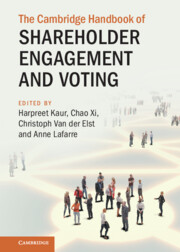Book contents
- The Cambridge Handbook of Shareholder Engagement and Voting
- The Cambridge Handbook of Shareholder Engagement and Voting
- Copyright page
- Contents
- Figures
- Tables
- Contributors
- Preface
- In Memoriam
- Abbreviations
- Introduction
- Part I Asia
- Part II Australia and North America
- Part III Europe
- 13 Shareholder Democracy in Denmark: Contrasting Law on the Books and Law in Practice
- 14 Shareholder Engagement and Voting in France
- 15 Shareholder Engagement in Germany
- 16 Shareholder Engagement and Voting in Greece
- 17 Shareholder Engagement and Voting in Italy
- 18 Shareholder Voting and Engagement in Norway
- 19 Shareholder Voting and Engagement in the Netherlands: The Dutch Institutional Approach
- 20 Shareholder Engagement and Voting in the United Kingdom
- Part IV Comparative Perspectives
- Index
14 - Shareholder Engagement and Voting in France
from Part III - Europe
Published online by Cambridge University Press: 10 September 2022
- The Cambridge Handbook of Shareholder Engagement and Voting
- The Cambridge Handbook of Shareholder Engagement and Voting
- Copyright page
- Contents
- Figures
- Tables
- Contributors
- Preface
- In Memoriam
- Abbreviations
- Introduction
- Part I Asia
- Part II Australia and North America
- Part III Europe
- 13 Shareholder Democracy in Denmark: Contrasting Law on the Books and Law in Practice
- 14 Shareholder Engagement and Voting in France
- 15 Shareholder Engagement in Germany
- 16 Shareholder Engagement and Voting in Greece
- 17 Shareholder Engagement and Voting in Italy
- 18 Shareholder Voting and Engagement in Norway
- 19 Shareholder Voting and Engagement in the Netherlands: The Dutch Institutional Approach
- 20 Shareholder Engagement and Voting in the United Kingdom
- Part IV Comparative Perspectives
- Index
Summary
As in many other countries, shareholders in French companies have only those powers that are conferred upon them or upon the general meeting. Nevertheless, the general meeting is vested with important rights: it is in charge of the election of the board of directors, has a say-on-pay and a say on related party agreements as well as a number of ‘fundamental decisions’ of the corporation. Shareholders make active use of their (voting) rights. In practice, shareholder participation remains relatively stable over time, with higher participating rates of shareholders with double voting rights and an increasing number of shares voted by mail. Most voting items are approved with a large majority of the votes, although those on remuneration, related party agreements and share issuances are sometimes heavily contested. Engaged shareholders make regularly use of shareholder proposals and shareholder questions. Further, every year, a number of French companies are confronted with activist shareholders who want to effect changes in the strategy or governance of the company, albeit with varying degrees of success. To meet their requests, an increasing numbers of companies are appointing a director with special responsibilities vis-à-vis shareholders.
Keywords
- Type
- Chapter
- Information
- The Cambridge Handbook of Shareholder Engagement and Voting , pp. 280 - 307Publisher: Cambridge University PressPrint publication year: 2022



